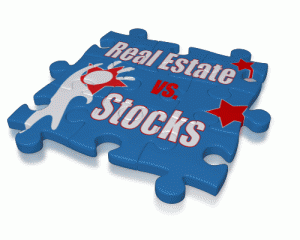Real Estate Versus Stocks
 So we’re often asked Real Estate versus Stocks … “which is better?”
So we’re often asked Real Estate versus Stocks … “which is better?”
With investing, though, the answer is always, always, always the same: “It depends.
All investing decisions are subordinate to your financial goals, risk tolerance, current income needs and your willingness to become personally involved with managing your investments. There is no one asset class that is always better than another, in every situation. Just think: If there were, no one would ever invest capital in anything else!
That said, if you are considering real estate versus stocks in your portfolio and you have always had a stock-heavy portfolio, or if you are just accustomed to thinking in terms of stocks, bonds and mutual funds when you think of retirement investing, there are some amazing things an exposure to real estate brings to the table that ordinary stock investing cannot match.
Land never goes to zero. Absent some sort of cataclysmic event like a volcanic eruption making your island disappear under the ocean, the value of land – unlike the value of any given stock – isn’t going to go to zero. It will always retain some intrinsic value. The same goes with a house. No matter what happens to house prices – and we’ve seen some significant volatility over the last decade to be sure – the essential, intrinsic utility of a house is the same as it ever was: You can live in it.
More Leverage is Available for Real Estate. By and large, it is easier to borrow money secured by real estate than for almost anything else under the sun (with the exception of a permanent life insurance policy). Why? Lenders know that it is historically a safe bet. The security of real estate is generally sufficient to support a 60 percent loan to value ratio, easily. It’s even higher when additionally secured by future income and where the borrower actually lives in the home. But many lenders are more than happy to lend on investment properties bought at a reasonable price.
This means that for ever dollar of your own money you invest, you can actually get the benefit of the appreciation and rental income generation of two or three more dollars of real estate assets. And all your rental income or other income needs to cover is the maintenance, mortgage, interest and insurance payments on the property.
Current Income. There are all kinds of land investments out there and not all of them necessarily generate much in the way of current income. But if you want your property to generate a substantial stream of current income it’s usually quite easy to do by selecting rentable properties at reasonable prices – and employing leverage to boost your rental yield per invested dollar.
Easy to Understand. When it comes to investing, complexity is your enemy. When considering real estate versus stocks…it should be noted that no one could understand Enron’s balance sheets. And few can truly understand what’s going on with the latest technology start-up, pharmaceutical or biotechnology firm. Even banking and finance stocks have demonstrated that they can get investors into trouble in unexpected ways, like an exposure to the risk of failure of some other company that failed to adequately hedge its exposure to the risks of credit default swaps. The spectacular failure of Long Term Capital Management – which itself had a relatively simple business model, eventually confounded and bankrupted multiple Nobel Prize winners. These were some of the smartest, most competent financial professionals ever to walk the earth – and yet they got hammered when markets went against them. They did not fully understand the cash flow properties and risk to that cash flow.
In contrast, though, anyone can understand investment properties, taken one at a time or in small groups: You invest money to buy a property and to maintain it, and people who use the property pay you rent. If your rent payments cover your expenses and mortgage payments, everything else is gravy.
Many a college dropout less has made his or fortune buying investment properties.
The good news when considering real estate versus stock: You can actually own rental property within an IRA. The law does not forbid it, and many people are already doing it, with terrific success. The income builds up within the IRA until retirement, generally at age 59½ or later, at which time rental income can continue to build up, tax-deferred, or you can take it out as ordinary income, just as it would be outside the IRA.
If you use a Roth IRA to hold the real estate, and it’s been in your Roth IRA account for 5 years or longer, the income could be tax-free.
Note: Income or capital gains attributable to borrowed money may still be subject to Unrelated Debt-Financed Income Tax.
Want to know more about real estate versus stocks within your IRA? Visit us at www.AmericanIRA.com, or call us at 866-7500-IRA(472). We’ll be happy to send you our free guide to Real Estate IRAs, free of charge.
We look forward to hearing from you.
Image by: presentermedia.com
